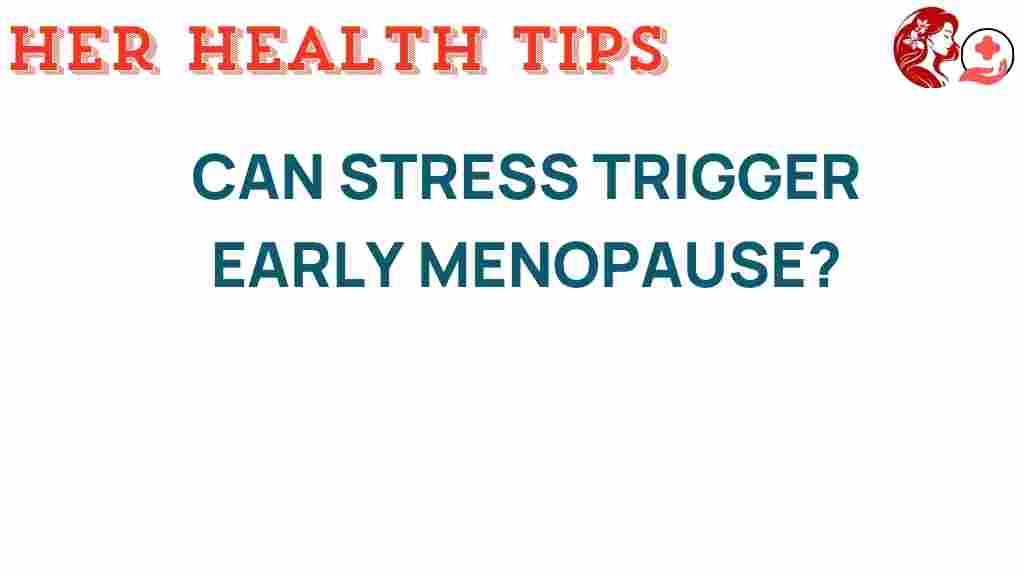Unraveling the Mystery: Can Stress Accelerate Menopause Onset?
Menopause is a natural biological process that every woman experiences, typically occurring between the ages of 45 and 55. However, the onset of menopause can be influenced by various factors, including genetics, lifestyle, and notably, stress. Understanding the intricate relationship between stress and menopause is essential for women’s health, as it helps in managing hormonal changes and promotes overall reproductive health. In this article, we will explore how stress can potentially lead to early onset menopause and the implications for women’s health.
Understanding Menopause and Its Phases
Before delving into the impact of stress, it is crucial to understand menopause itself. Menopause is characterized by the cessation of menstruation and a decline in reproductive hormones, primarily estrogen and progesterone. This transition can be broken down into three phases:
- Perimenopause: The phase leading up to menopause, where hormonal fluctuations begin, and irregular periods may occur.
- Menopause: Defined as having gone 12 consecutive months without a menstrual period, marking the end of a woman’s reproductive years.
- Postmenopause: The years following menopause, where symptoms may continue but typically stabilize.
The Role of Stress in Women’s Health
Stress is a common experience in modern life, affecting both mental and physical health. When the body perceives stress, it triggers a hormonal response, increasing cortisol production. Elevated cortisol levels can lead to various health issues, including:
- Weight gain
- Sleep disturbances
- Increased anxiety and depression
- Disruption of hormonal balance
Chronic stress can disrupt the delicate balance of reproductive hormones, potentially leading to an early onset of menopause. It is essential for women to recognize the impact of stress on their bodies and seek ways to manage it effectively.
How Stress May Accelerate Menopause Onset
Research suggests that stress can influence menopause onset through various mechanisms:
- Hormonal Imbalance: Stress causes an increase in cortisol, which can interfere with the production of estrogen and progesterone, leading to irregular menstrual cycles.
- Ovarian Function: Chronic stress may affect the ovaries’ ability to produce eggs, potentially leading to earlier menopause.
- Genetic Factors: Some studies indicate that women with a family history of early menopause may be more susceptible to the effects of stress.
Lifestyle Factors Influencing Menopause and Stress
In addition to stress, several lifestyle factors can contribute to the timing of menopause. These factors include:
- Diet: A poor diet high in processed foods and sugars can exacerbate stress and hormonal imbalances.
- Physical Activity: Regular exercise is known to reduce stress levels and promote hormonal balance.
- Substance Use: Smoking and excessive alcohol consumption can negatively impact reproductive health and may lead to earlier menopause.
Incorporating healthy lifestyle choices can help mitigate the effects of stress and support women’s health during this transitional phase.
Managing Stress for Better Reproductive Health
Managing stress is crucial for women’s health, especially during the perimenopausal and menopausal phases. Here are some effective strategies:
- Mindfulness and Meditation: Practicing mindfulness and meditation can help reduce stress and improve mental health.
- Exercise: Engaging in regular physical activity can boost endorphins and help manage stress levels.
- Healthy Eating: Consuming a balanced diet rich in fruits, vegetables, whole grains, and lean proteins can support hormonal balance.
- Social Support: Connecting with friends and family can provide emotional support and reduce feelings of isolation.
For more detailed strategies on stress management, consider visiting this resource.
Signs of Early Onset Menopause
Recognizing the signs of early onset menopause is vital for women’s health. Common symptoms may include:
- Irregular periods
- Hot flashes and night sweats
- Vaginal dryness
- Difficulty sleeping
- Emotional changes, including anxiety and depression
If you experience these symptoms at an early age, it is essential to consult a healthcare professional for evaluation and guidance.
When to Seek Professional Help
While managing stress is important, there are times when professional help may be necessary. Consider seeking support from a healthcare provider if you experience:
- Severe mood swings or depression
- Persistent anxiety that interferes with daily life
- Significant changes in menstrual cycles
- Physical symptoms that disrupt your quality of life
A healthcare provider can help assess your situation, offer treatment options, and provide resources for managing stress and hormonal changes effectively.
Conclusion
In conclusion, the relationship between stress and menopause is complex and multifaceted. While stress can potentially accelerate menopause onset, understanding its impact on hormonal changes and reproductive health is crucial for women. By recognizing the signs of early onset menopause and implementing effective stress management techniques, women can improve their overall health and well-being during this significant life transition.
Adopting a healthy lifestyle, seeking social support, and consulting healthcare professionals when necessary are vital steps in navigating the challenges of menopause. Remember, taking care of your mental health is just as important as managing physical health, especially during this transformative phase of life.
For further reading on women’s health and menopause, check out this informative article.
This article is in the category Reproductive and created by HerHealthTips Team
